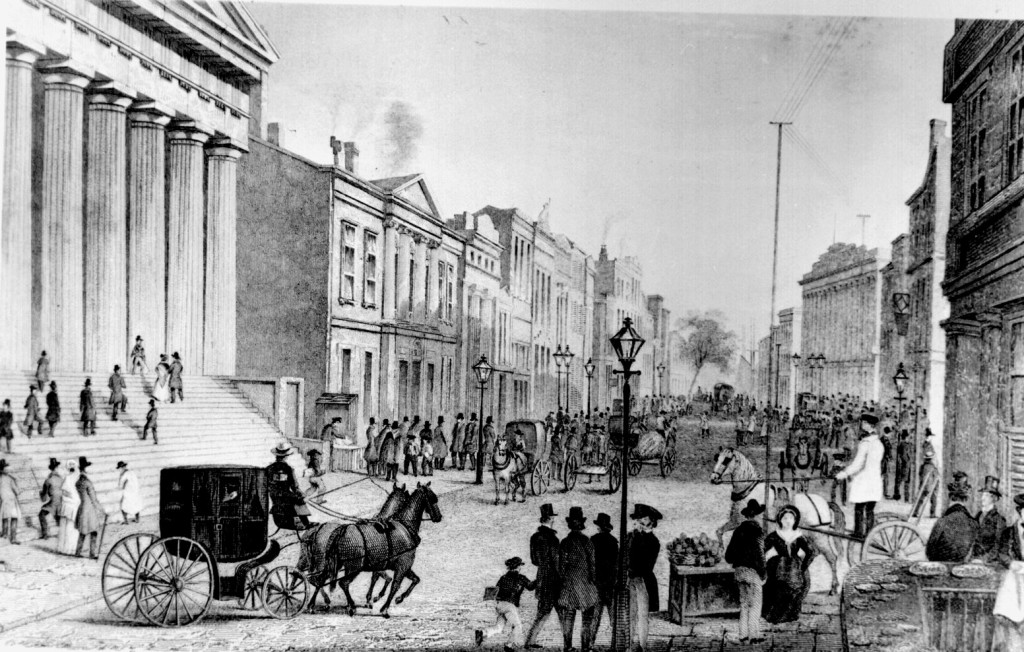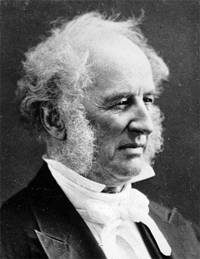by Shane White
Jeremiah Hamilton: Prince of Darkness
At a little after ten o’clock on Tuesday evening, July 14, 1863, the second day of the New York Draft Riots, a mob marched down East 29th Street chanting menacingly “68, 68, 68.” That was the number where Jeremiah Hamilton and the rest of the Hamiltons lived. When the motley collection of Irish and Irish-American men and boys arrived at their destination, a few went to the basement door, kicked in a panel and forced their way inside. The intruders then rushed up the internal steps. Eliza Jane Hamilton later related what had happened as calmly as if she were describing a tea party: “I met them at the head of the stairs.” She asked them what they wanted and one answered: “they were looking for Mr Hamilton as they wanted to kill him.”
Who was Mr Hamilton and why did his neighbors want to lynch him?

Image is in the public domain via Wikimedia.com
Jeremiah Hamilton was a broker whose very existence as the city’s first black millionaire flies in the face of our understanding of the way things were in nineteenth-century New York. Although a pioneer, far from being some novice feeling his way around the economy’s periphery, he was a Wall Street adept, a skilled and innovative financial manipulator. Unlike later black success stories such as Madam C.J. Walker, the early twentieth-century manufacturer of beauty products and often assumed to be the first African American millionaire, who would make their fortunes selling goods to black consumers, Hamilton cut a swathe through the lily-white New York business world of the middle decades of the nineteenth century. In this domain his depredations soon earned him the nickname of “The Prince of Darkness.” Others, with even less affection, simply called him “Nigger Hamilton.”
No one will ever erect a statue honoring Jeremiah Hamilton—he was not a saint, indeed he was at least as aggressive and ruthless as most antebellum businessmen. Rumors of counterfeiting and scams against insurance companies dogged him until he died, partly because even the more far-fetched stories often had elements of truth to them. Not that the ethics or business practices of many of his contemporaries could bear too much scrutiny, but Jeremiah Hamilton was the one saddled with the title “Prince of Darkness.” Wall Street was never going to be a level playing field for the trailblazing African American. Yet for all that, brokers and merchants generally were more interested in the color of the black man’s money than his skin. Not that Jeremiah Hamilton gave a damn one way or the other: he simply brushed aside all obstacles placed in his way, or connived to get around them, and carried on amassing his fortune.

Image is in the public domain via theblogthatbuiltamerica.wordpress.com
Although almost totally forgotten since his death in 1875, Jeremiah Hamilton is a fascinating character. His was a dramatic life, cinematic in its vividness. It included incidents of derring-do, a trial that was the talk of the town, and more than the occasional angry confrontation about business ethics or his lack of them. In all this, Jeremiah Hamilton never took one backward step. He was not a forgiving man. If you crossed him, he returned the favor and always added a few percent for interest. It was one thing for a Cornelius Vanderbilt, or any other white man, to be this aggressive, rather another for the so-called Prince of Darkness to behave in such a fashion. He often rubbed people up the wrong way though he never seemed to care too much. Jeremiah Hamilton could also be charming, as silkily smooth as any other hustler trying his luck on Wall Street. A wise person did not trust him very far at all. He had learned in a hard school that books should be balanced, accounts for the most part settled, and the law was simply something to be taken advantage of or got around. This African American was as at home in courtroom or East River waterfront, New York Society library or Delmonico’s. He could tell you which railroad stocks were a good buy, converse about Francis Bacon’s philosophical treatises or discuss Henry Fielding’s The History of Tom Jones, A Foundling (1749), stitch up a deal to sell a refitted steamboat to Cuba, dash off an article for the New York Sun, and arrange to scuttle an over-insured ship. Most remarkably of all, he was a black man, who became rich while living out the American nightmare of race.
Is it any wonder the mob had wanted to string him up from the lamppost outside the front door of his splendid house on East 29th Street?
SHANE WHITE is the author of PRINCE OF DARKNESS: The Untold Story of Jeremiah G. Hamilton, Wall Street’s First Black Millionaire and the Challis Professor of History and an Australian Professorial Fellow in the History Department at the University of Sydney specializing in African-American history. He has authored or co-authored five books, including Playing the Numbers, and collaborated in the construction of the website Digital Harlem. Each project has won at least one important prize for excellence from institutions as varied as the American Historical Association and the American Library Association. He lives in Sydney, Australia.
